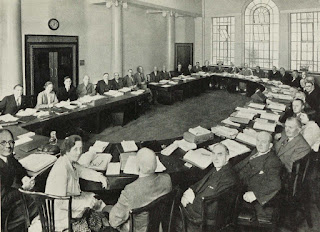In their different ways Britain and France fail to match German autarky
Leon Blum’s second and final Front Populaire government was embattled
from the start. Gentle proposals to intervene in the Spanish civil war were
emphatically rejected by the parties of the right and just as loudly trumpeted
by the Communists. Blum remained committed to rearmament and finally took the
plunge that he had avoided during his first government: announcing the introduction
of exchange controls so as to cope with
the inflationary pressures of a debt-financed weapons programme. The Senate rejected
Blum’s finance bill and withheld powers to government by decree. Mass strikes
in the engineering industry added to his woes.
The Anschluß
had pushed Britain too in the direction of accelerating rearmament. But even
though the government enjoyed a solid and dependable majority coupled with an
ineffectual and divided opposition, it was not going to go to the lengths of sacrificing
conservative financial policy. A sound, market economy was considered to be the
fourth arm of defence. Instead the representatives of the engineering and other
employers most likely to be involved in the programme and the Trades Union
congress were summoned separately to Downing Street to be told to behave nicely
together because it was important for national security. No-one was savage
enough to mention the dread term “dilution”, the expansion of the available
labour force by bringing in relatively unskilled workers to perform tasks
reserved for highly paid skilled (or more efficiently unionized) workers.
The Japanese invasion of China began
to lose steam. The city of Xuzhou was taken from the Chinese but the key
purpose of the operation failed. The Chinese army units broke out of the thin
crust of Japanese troops around the city and regrouped in safety on the far
side of the Grand Canal. In itself the city had no strategic value; only the full
elimination of the Chinese troops would have made a serious contribution to
further progress. The Chinese army was still far too weak to expel the Japanese
but Japan was now facing a stalemate in which it could hold major cities but
had too few men to destroy all Chinese resistance.



Comments
Post a Comment